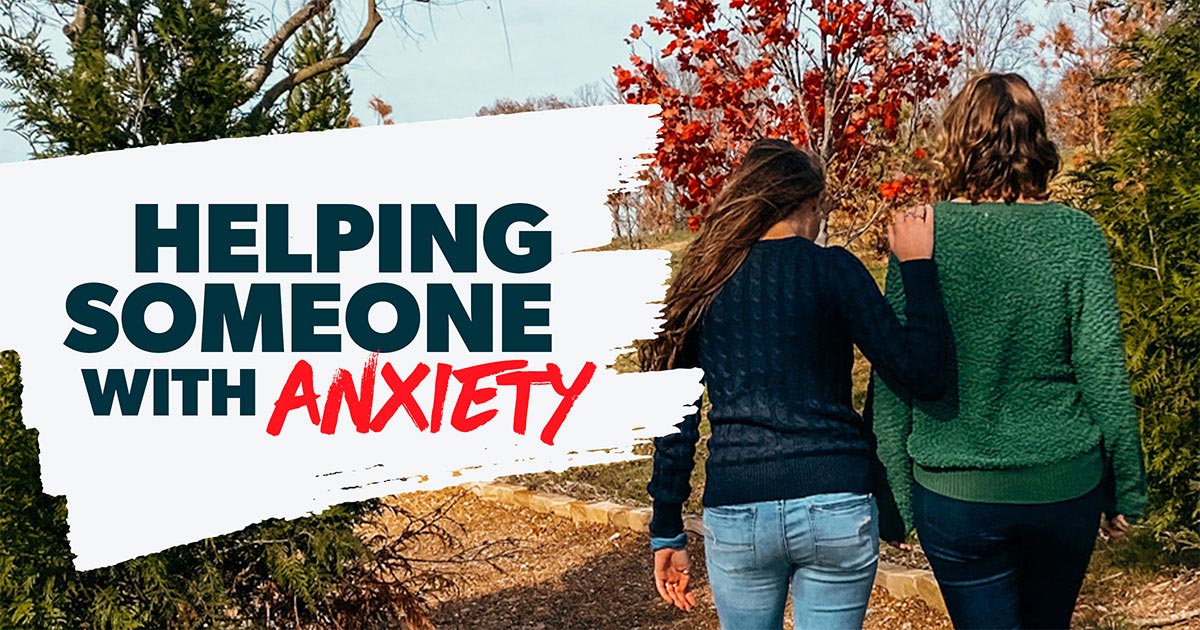The first thing I want you to know is this: My heart hurts for you. You’re watching a person you love burning a hole through their own soul. They’re spinning out and afraid, crushed by the weight of anxiety.
I applaud you for being the kind of person who loves deeply and wants to take action. If there were more people like you in the world, there would be less anxiety.
It hurts to watch someone you love hurting—I know because I’ve been there. I want to share a few practical ways you can help someone with anxiety, whether it’s your spouse, friend, parent, sibling or child. You can’t control the thoughts they think and the decisions they make, but you can control your choices about how you support, honor and love them through this tough season.
A quick disclaimer here: This article is for people who have adult loved ones struggling with anxiety. If you’ve got a young child with anxiety, check out this article for some additional age-appropriate ways to help kids.
1. Recognize the signs of anxiety.
Some people experience a low-level hum of anxiety that hangs over them like a storm cloud, and others have more episodic seasons or days that strike like lightning, seemingly out of nowhere. If you feel confused, put off or even annoyed by your loved one’s behavior, you need to slow down, not say anything (especially at first), and pay attention. Identifying the signs and symptoms of anxiety is the first step toward helping the person you love.
There are three categories of symptoms to watch for:
Physical (Body)
- Tight chest
- Shallow breathing
- Racing heart
- Difficulty sleeping
- Trembling
- Sweating
- Tense shoulders, neck and back
- Nausea, stomach aches or diarrhea
- Headaches
Psychological (Thoughts)
- Intrusive thinking (unwelcome, accusatory thoughts)
- Ruminating (repeating thoughts, stories and ideas over and over)
- Feeling a sense of impending danger, panic or doom
- Constant comparison
- Indecisiveness
- Difficulty concentrating
Behavioral (Actions)
- Avoidance of anxiety-inducing situations (including avoiding people, touch, media, books or other triggers)
- Isolation and withdrawal
- Restlessness and agitation
- Irritability
- Easily startled
- Obsessive or compulsive behavior
Sometimes, you might be able to spot these symptoms before your friend or spouse or parent does. You might be able to help them identify what they’re experiencing by kindly asking, “Hey, I’m feeling some tension from you. Would you share how you’re feeling?”
2. Stop treating your loved one like a machine.
If you see someone struggling and spinning out of control, hurting and afraid, your first impulse might be to try and fix the situation with advice and rational thinking. This comes from a good place. We just want our loved one to be better, and we don’t want them to hurt!
But there’s a dangerous side to this impulse. Without realizing it, we begin to treat the people in our lives as machines that need to be fixed or puzzles that need to be solved. When they feel anxious or panicked, we want to jump in and fix them. Hear me on this: Your loved one is not a broken machine. Anxiety is a signal that they’re feeling unsafe and disconnected. Instead of trying to “fix” them, lean in and listen. Provide a safe, supportive space for connection.
Instead of focusing on solving the problem, offering advice, or muscling your way to a solution (I’m talking to both men and women here!), just ask yourself how you can simply be with your loved one. Offer support. Offer love. Offer a listening ear. Offer your presence. Clean the kitchen or fill their car with gas. Move toward with your heart and not at with your advice.
3. Don’t buy into the common myths about anxiety.
We have a lot of misconceptions about anxiety in our culture. As a result, we can give really bad (though well-intentioned) advice to people we’re trying to help. Here are a few of the common phrases people with anxiety often hear:
- Just chill out.
- Take your pills.
- Try some yoga or deep breathing.
- Anxiety is a disease.
- Anxiety is a genetic disorder that was passed down to you from your parents. It’s just the way you are!
- Anxiety means something is wrong with you.
- Anxiety only affects lazy, weak or undisciplined people.
- If you’re anxious, you’re probably hiding something from your loved ones, from God or from yourself.
- Anxiety is just stress. We all worry. Get over it.
Now, you might not say those things word for word, but I bet you’ve heard a similar rationale before—or at least felt it. The truth is, anxiety is caused by about a million different factors converging together to create a chaotic ecosystem. And while things like yoga and breathing can help, healing from anxiety takes more than just a 10-minute meditation with some essential oils. Don’t belittle or minimize the anxiety your loved one is feeling.
4. Provide safe and comforting physical touch.
I’m a big advocate for skin-to-skin contact. We live in a culture that’s starved for physical affection. We all crave it, and we all need it. A warm hug, a cuddle session on the couch, or holding hands tells your loved one, When you’re with me, you’re safe.
Want to build a non-anxious life? Learn how in Dr. John Delony’s new book.
Skin-to-skin contact isn’t just for newborns, and it often isn’t sexual. Offering safe and affectionate physical touch is a powerful way to calm anxiety. Skin-to-skin contact reduces heart rate, which is one of the physical manifestations of anxiety. Physical touch also has the power to erase feelings of loneliness and disconnection.
Of course, physical touch will look different depending on the person you’re comforting. It could be holding hands with your spouse and looking them in the eye. It could be a tight, 60-second hug with a friend (yes, 60 seconds is long, and it’s awkward, and it will be uncomfortable at first—but try it and see what happens).
It should go without saying, but before you touch anyone struggling with anxiety, even (and especially) your spouse, ask their permission. Since anxiety is an alarm signaling a lack of control, reaching out to touch someone without their permission could make them feel like they’re not in control of their own bodies. In an effort to help, you may make things worse. Gently extend your hand as an offer for them to take your hand. Kindly ask, “Will you walk with me for a moment?” Or you might ask, “Do you mind if I put my hands on your shoulders?” or “Can I hug you?” If someone isn’t interested in your touch, don’t take it personally. Respect their independence and move on to the next step.
5. Ask questions and listen.
Once you’ve helped your loved one feel safe, you can begin to go deeper in conversation and explore some of the root causes of their anxiety. Don’t force a conversation if it’s not the right time. Let them know that you’re available and interested in talking, but let them call the shots about when and where and what.
Remember: The goal here isn’t to fix or solve or get rid of the problem. It’s to offer support and compassion—and one of the best ways to do that is by asking questions and listening intentionally.
Here are some examples of questions you can ask:
- When did you begin to feel this anxiety?
- Was there a specific person or event that triggered it?
- How can I support you today?
- What do you need from me right now?
- Is there anything that’s stressing you out that I could help you say no to?
And after you ask these questions, just shut up and listen. Look them in the eye. Nod your head. Validate what they share with simple responses like, “Yeah, that sucks.” Affirm their vulnerability by saying things like, “Wow—thank you for sharing that with me,” or “I’m so proud of you for opening up about this.”
Most of all, don’t give advice unless they specifically ask for it. And even then, check twice before offering your opinions.
6. Find ways to serve and take care of your loved one.
Your friend or parent or spouse or sibling might be spiraling into anxiety because of being overcommitted or stressed with chaos and demands of life. If it’s helpful, find ways to gently and quietly take responsibility and stress off their plate. Help with housework. Run to the grocery store for them. Fill their car with gas. Take the kids out for a walking adventure.
Just make sure you’re not enabling that person to stay frozen in their anxiety. The point here isn’t to remove their responsibility to take ownership of their lives, but to show love, support and compassion when you’re needed by being a good friend.
7. Help your loved one plan for the future.
Anxiety is often rooted in a fear of the future and things outside our control. Making a plan for each day and each week helps keep anxiety at bay because you know what to expect and you know what role you have to play. This is especially important if you have a spouse struggling with anxiety.
Be specific about what your picture of the upcoming days and weeks look like for you. Planning together and affirming each other’s decisions helps your loved one believe in their bones that they’re safe and supported and can finally feel peace of mind.
8. Encourage your loved one to talk to someone who can help.
Even if you deserve the husband of the year award, your expertise can only go so far. I’ve been doing this for years, and I still find myself in over my head when working with someone through a challenging situation. Anxiety can be rooted in years of trauma and neglect and the toxic values we absorb about ourselves. Those ugly beliefs will impact how we relate to people down the road. It’s quite possible that your loved one might need support and guidance from a professional. That could be a pastor at church or finding a good therapist (if they’re not already seeing one).
Often, folks who feel trapped by anxiety need reassurance that they’re worth the time and money investment of professional help. It takes a lot of courage to choose vulnerability and to do the hard work of facing your anxiety. So, be your friend’s biggest cheerleader. And if it’s your spouse who needs counseling, you can offer to go together so you can learn tools to support them along their journey.
9. Remind your loved one that they’re worthy of being well.
One of the most important things you can do to help a friend who’s struggling with anxiety is remind them that they’re worth being well. They deserve to live a full, rich and joyful life—free from the crippling restraints of anxiety. We’re complex creatures with many layers of needs, including:
- A nutritious diet
- Plenty of sleep
- Consistent exercise
- Close, supportive and intimate relationships
- A broader sense of community and belonging (church, city or common interest group)
- Meaningful work
- Healing from past trauma
If your loved one is struggling in any of the above areas, encourage them to take steps to get well. Try a fitness class together. Cook some healthy recipes. Help them dream about a new job opportunity. If they’re not interested in joining you, set an example and seek to begin your own wellness journey. Sometimes our loved ones will follow the roads that we’ve carved for ourselves. Whatever area(s) need some attention, keep reminding your loved one that they’re worthy of a better life.
10. Learn about anxiety together.
Over the years, the more I’ve learned about anxiety, the better I’ve become at responding to my own challenges (and to the challenges of my friends and family). Education and community have a remarkable way of helping people heal.
If your loved one is scared to face their anxiety head on, encourage them to lean in, listen to the anxiety alarms, and pay attention to what they’re trying to say. Don’t underestimate the power of walking little by little, day after day, with your loved one on their journey. Read books together. Listen to podcasts. The more information you know (and the more you understand yourself), the better decisions you can make.
Anxiety Doesn’t Have to Be Forever
Good folks, I want to high-five you for loving the people around you enough to learn how you can support them. If you’re interested in learning about the Six Daily Choices that can help you (or someone you care about) live a more peaceful, joyful life, I encourage you to read my new book, Building a Non-Anxious Life. You’ll begin to understand how anxiety is actually trying to keep you safe—and how to better handle whatever life throws at you. Start reading it for free today.
Read the full article here


















